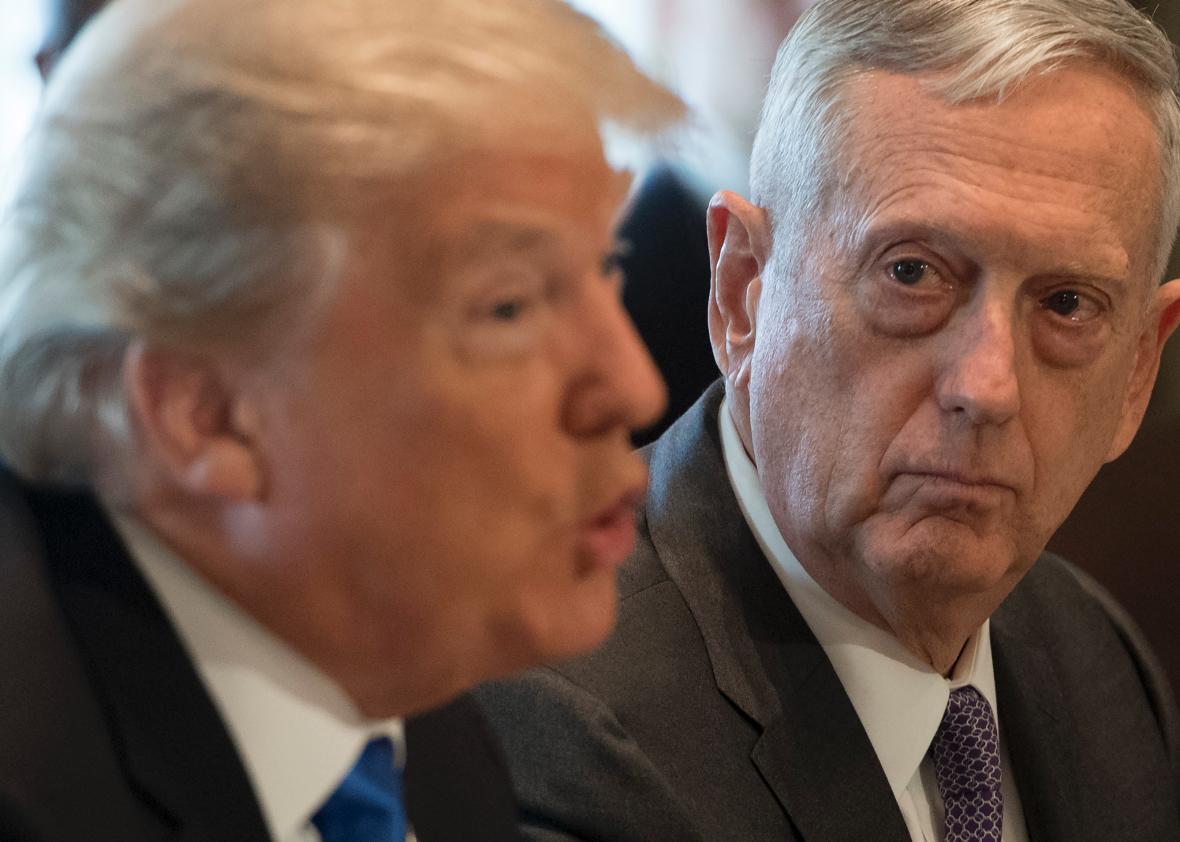At 1:07 p.m. on Monday, the Associated Press tweeted a stunning claim:
The tweet seems to contain two pieces of information: First, the Pentagon will permit openly transgender individuals to enlist in the armed forces beginning in January; second, that the Pentagon made this decision in spite of President Trump’s ban on transgender troops. The first claim is uncertain and premature; the second implication is flat-out wrong. There is still a decent chance that the trans troops ban will be in effect come Jan. 1, 2018. And if the ban is not in effect, it will be because of a court order—not because the Pentagon went rogue.
Here’s where things stand with regard to the trans troops ban. In June 2016, the Department of Defense invited transgender troops already serving in the armed forces to come out, after commissioning and conducting multiple studies on the matter. The DOD concluded that open transgender service posed no threat to military readiness or unit cohesion. A RAND study also found that the health care costs of transgender troops would be negligible. So the DOD let transgender troops serve openly—but it did not allow openly transgender people to enlist in the military. Instead, it decided that the enlistment ban would end in July 2017.
In July, however, Secretary of Defense James Mattis delayed the termination of the enlistment ban once again, pushing it back to Jan. 1, 2018. A few weeks later, Trump tweeted his total ban on transgender service. The announcement was a double defeat for transgender people: Not only did it scrap the termination date for the enlistment ban, meaning trans people were indefinitely barred from joining the armed forces; it also reversed the military’s acceptance of already-serving transgender troops.
Civil rights advocates, fearing an imminent purge, sued to block the ban. In lawsuits filed in different federal courts across the country, they argued that the ban discriminated on the basis of sex and transgender status in violation of equal protection. On Oct. 30, U.S. District Judge Colleen Kollar-Kotelly agreed, ruling that the government may not implement the proposed policy. Instead, Kollar-Kotelly instructed the government to revert to the status quo with regard to transgender military service. Obviously, that prevented the Pentagon from purging already-serving transgender troops. But the Trump administration wasn’t sure whether the ruling also revived Jan. 1 as the termination date of the enlistment ban. It asked Kollar-Kotelly for a clarification, and she explained that, indeed, the Pentagon must permit trans enlistment on New Year’s Day of 2018. (Meanwhile, a different federal court blocked the trans ban, calling it “capricious,” “arbitrary,” and “outrageous.”)
The Trump administration wasn’t pleased that Kollar-Kotelly revived the Jan. 1 termination date, so it asked her to put this part of her ruling on hold while it appealed her decision. On Monday, she refused to do so. That means that, unless a higher court weighs in, the Pentagon is obligated to follow Kollar-Kotelly’s order on Jan. 1 and allow enlistment of openly transgender individuals. It seems that the AP was trying to express this fact in its tweet. But even then, it leaves out crucial information: A higher court may well put Kollar-Kotelly’s order on hold before the new year arrives. The Trump administration will almost certainly seek a stay; it filed a notice of appeal in both cases, indicating that it plans to fight these rulings aggressively. And there is still ample time for a higher court—perhaps even the Supreme Court—to intervene and stay Kollar-Kotelly’s decision.
To summarize: Trump wants to prohibit all transgender people from serving in the military. The Pentagon is trying to follow his orders. But two federal courts have prohibited the Pentagon from discriminating against transgender people. Their rulings require the armed forces to permit transgender enlistment starting Jan. 1. And even if they aren’t, the uncertainty surrounding trans service may dissuade many trans people from enlisting until the legal questions are resolved.
